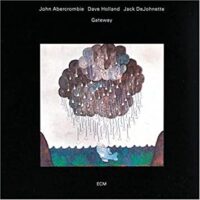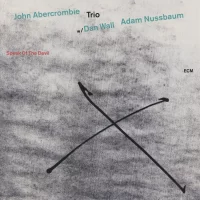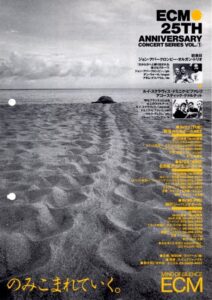#260 ジョン・アバークロンビー Part 3
John Abercrombie Part 3
ジョン・アバクロンビー・インタビュー
ウェイン・ゼイド @ミズーリ州セントルイス市 2000年2月13日
photo above:from Wikipedia
訳責:Kenny Inaoka 稲岡邦彌 (JazzTokyo)
Part 2より続く
♫ NECではバイオリンの生徒の8割が、日本の女学生
WZ:彼らはプロではないんだよね?
JA: いやいや、ふたりともじつにいいプレイヤーだったよ、とくにカツは。彼は本当に音楽的で、ギターがとても上手だった。彼は日本に帰ったけど、テツはまだニューヨークに住んでいると思う。だから、僕は日本のミュージシャンとのつながりがあるんだ。でも、彼らの面白いところは、レッスンに来るとき、2人ともテープレコーダーを持ってくるんだ。生徒の中には、メモもテープレコーダーも持たずにやってきて、何もかも忘れてレッスンを終えてしまう連中もいるから、彼らはとてもスマートだと思ったんだ。
WZ:テツとカツの英語はどうだったんだい?
JA:かなり良い。 僕の日本語はゼロだったけど。だから、「ドーモ」以外は、あまり話すことがなかったんだ。でも、彼らはかなり上手だったたよ。僕があることを教えようとするんだけど言葉の問題でうまくいかないこともあるんだ。でも、そのためにテープレコーダーがあるんでね。演奏することが大事だから。彼がやってきて、「何を演ろうか?」「<枯葉>にしましょう」と言って彼らはテープレコーダーのスイッチを入れる。彼らが、「ワン、トゥ、ってカウントしてくれる。
彼らが何よりもやりたかったのは、私と一緒に演奏してそれを録音することだった。そしてそれを持ち帰って聴き直し、そこから何かを学ぶ。そのやり方がとても賢明だと思うんだ。結局、ほとんどの生徒と同じことをやっていたんだね。ただ、演奏して話すだけ。大げさな方針とか課題は用意せずにね。だから、その点でテツとカツは完璧にフィットしていたといえる。とても知的で、聡明だったね。
でも、多くのミュージシャンが言っていることだと思うけど、日本のジャズ・ミュージシャンで、とくに独創的だと思った人を聞いた記憶がないんだね。でも、日本にそういうミュージシャンがいないという意味ではなく、今まで聴く機会がなかったということだね。とはいえ、それほど独創的な音を出すミュージシャンは、時代的にもそれほど多くはないと思うけど。アメリカ人でも、ヨーロッパ人でも、日本人でも、誰もがね。僕らは皆、誰かの真似をしなければならない、ギター言語を学ぶ必要があるということだね。
1回目か2回目に日本に行ったとき、休日やライブの後にナイトクラブのようなところに出かけ、ショーバンドのようなバンドの演奏を聴いたことを覚えてる。ラスベガスにいてもおかしくないくらい、彼らの歌や演奏はまさに完璧だった。ベガスのレヴューか何かに出てきそうな感じだ。女の子のシンガーもいて、抑揚も日本語のイントネーションもまったくなく、アメリカ人のような歌いっぷりでね。すべて英語、完璧な英語でした。歌っているのは、ソニーとシェールとか。オズモンズとか!そんな感じだった。つまり、ポップスのようなものだったね。
WZ:日本人がアメリカのクラシック音楽家をどのように見ているかという感覚を持ってるの?
JA:僕はあまり触れたことがないけど。他のジャンルの音楽ということかい?
WZ:ポップスはなんとなくわかるし、ジャズは間違いなくわかる。ただ、例えばイツァーク・パールマンがどの程度好まれているのかが気になるんだ。
JA:ああ、そういうことね。僕は今、ニューイングランド音楽院で教えているんだ。昨年から始めたので、今年で2年目だけど、非常勤講師としてね。基本的にクラシックの学校で、小さなジャズ科があるんだけど、学校の廊下を歩いているヴァイオリニストのほとんど、いや、ケースを持って歩いているバイオリンの生徒の8割が、日本の女学生だと思うね。
WZ:レイ・ドラモンドは、ピアノを学ぶことは日本の若い女の子に開かれた数少ない機会のひとつだと言ってたけど。
JA:その通りだと思う。バイオリニストもたくさんいるし、チェリストもね。アイザック・スターンが中国に教えに行ったときのドキュメンタリー、「毛沢東からモーツァルトへ」とTVで観たんだけど、素晴らしいドキュメンタリーでね、たくさんの中国の女の子がバイオリンを弾いているのを見たのを覚えているね。
でも、僕はほとんどクラシック音楽家とは縁がないんだ。ただ、国民はアメリカの音楽家をとても尊敬していると思うけど。
♫ 1セットの演奏で2ヶ月分のギャラを稼いだ
WZ:ということは、初めて日本に行って演奏したときから、もう20年以上経っているんだね。最後に行ったのは、直近ではいつなんだろう?
JA:最後に行ったのは、ハービー・ハンコックのバンドと対バンの一夜限りのギグだった。これはとても面白い形で実現したんだ。あっという間の出来事で、何が起こったのかわからなかったくらいだった。富士山周辺で開催された「マウント・フジ・フェスティバル」か何かで。「マウント・フジ・ジャズ・フェスティバル」ではなく、「ジャズ・オン・ザ・レイク」みたいな名前だったなあ。ハービーはマイク・ブレッカー、ジョン・スコフィールド、ジャック・デジョネット、ドン・エイリアスとバンドを組んでいた。僕は、マーク・ジョンソンとピーター・アースキンとのトリオだった。そして日本の主催者の希望は、ハービーが登場する前に、ハービーのバンドの各メンバーに、毎晩違うメンバーでオープニングを飾ってほしいというものだった。とても奇妙なコンセプトだよね。例えば、ある晩は、まずマイケル・ブレッカーが自分の選んだバンドで演奏し、それからハービーと演奏する。次の晩は、ジョン・スコフィールドのバンドがハービーの前座を務める。
 主催者の希望は僕らに、ジャック・デジョネットと僕とデイヴ・ホランドでバンド組んで欲しかったんだ。僕らはその3人で「ゲートウェイ」というトリオを組んでいたからね。だけど、ジャックは腱鞘炎という身体的問題を抱えていて、一晩に2つのギグをやるのは嫌だったんだ。だから、僕はそのギグには参加できないと思っていたんだ。でも、そのあと、とにかく僕に演奏してほしいということになってね。一回のライブで信じられないようなギャラが提示されたんだ!それでマークとピーターに電話してね。主催者は僕のオルガン・トリオではなく、マークとピーターを欲しがった。それで、僕らはビジネスクラスで駆けつけ、演奏したというわけさ。
主催者の希望は僕らに、ジャック・デジョネットと僕とデイヴ・ホランドでバンド組んで欲しかったんだ。僕らはその3人で「ゲートウェイ」というトリオを組んでいたからね。だけど、ジャックは腱鞘炎という身体的問題を抱えていて、一晩に2つのギグをやるのは嫌だったんだ。だから、僕はそのギグには参加できないと思っていたんだ。でも、そのあと、とにかく僕に演奏してほしいということになってね。一回のライブで信じられないようなギャラが提示されたんだ!それでマークとピーターに電話してね。主催者は僕のオルガン・トリオではなく、マークとピーターを欲しがった。それで、僕らはビジネスクラスで駆けつけ、演奏したというわけさ。
WZ:では、ハービーのバンドと一晩だけ対バンで演奏したというわけね?
JA:そうさ、45分のセットか何かだ! とんでもない金額を稼いだよ。1回のセットで、おそらく2、3ヶ月の仕事よりも多くの金を稼いだんだ!少なくともバンドとしてそれを実行した、そしてギャラを3人で分け合った。あっという間の出来事だったので、ほとんど覚えていないんだけどね。
WZ:それは何年前のことだったの?
JA:そうだなあ、たぶん4年前くらいかな。それが、僕の直近の日本の仕事さ。実は今、8月末にまた日本に行くという話があるんだ。ラース・ダニエルソンというベーシストと、デンマーク出身の女性シンガーと一緒に、ブルーノート・クラブに出演するという話。でも、それをやるかどうかはわからない。なんだか奇妙な感じでね..
WZ:Lars Danielssonは、同じく素晴らしいベーシストのPalle Danielssonと関係があるのだろうか?
JA: いいや、彼らは関係ないと思う。二人ともスウェーデン人で、素晴らしいベーシストだけど。
WZ: 他に日本で演奏したことは?
JA:他に3、4回あったかな。2回目に行ったときは、フランスのバンドとジョー・ロヴァーノと一緒だった。とても珍しいことでね。フランスのプロモーターがアンリ・テクシエというフランス人ベーシストのツアーを組むことになったんだけど、アンリは僕とジョー・ロヴァーノとアルド・ロマーノというフランス人ドラマー(イタリア人だったかもしれない)と一緒にバンドを組んでいたのさ。それでカルテットになったんだ。興味深いツアーだったけど、あまりうまくはいかなかった。楽しいツアーだったけどね。
大きなホールで演奏したんだけど集客はよくなかった。誰もアンリやアルドを知らなかったし、ジョー(ロヴァーノ)は今のように有名になる前で、普通のサックス奏者だしね。あまり人が集まらなかったのは、ちょっと残念だったね。でも、フランスのバンドと一緒に来日日できたのは面白い経験だった。
そのツアーでは、小さなホテルに泊められてね。つまり、エコノミークラスの日本ツアーというやつさ。トイレ、洗面台、シャワー、すべてがひとつの小さなユニットのようになっていて、バスユニット全体を持ち上げてホテルの外に持ち出せるような感じでね。とにかく、すべてがとても小さかった。でも、楽しかったなあ。
そのあと、ブルーノートで演奏するために日本に戻り、その時は日本をもっと見る機会があったんだ。マーク・ジョンソンとピーター・アースキンともトリオだったけど、、2回くらい行ったかもしれないね。東京と大阪、福岡のブルーノートで演奏したんだ。東京と大阪と福岡の3都市を回ったんだけど、東京には妻も呼び寄せた。ライヴの構成はとても簡単で、1セット目が7時、2セット目が9時で、10時30分にはすべて終わるんだ!ホテルの部屋に戻って、寝て、起きたらその日は一日中観光できるんだ。それがルーティンだった。だから、有名な都市にも出かけられたんだね。どういうわけか都市の名前は忘れてしまったんだけど。寺院で有名な都市もあったね。大阪にもひとつ名所があったね。
♫ 広島では平和資料記念館とプロ野球観戦
WZ:野球の試合を見たのはこのツアーだったのかな?
JA:いや、ジョー・ロバーノと一緒の時だった。あれは興奮したね。僕らは広島にいてね、ヒロシマの慰霊碑も見に行ったんだ。出かけて行って、目撃するということは大変な体験だったね。中に部屋があり、大きな円形の部屋なんだけど、順を追って観るようになっている。部屋を一周する壁画があってね、爆弾が落ちたときに何が起こったかを目視するんだ。恐怖を感じたね...。署名する名簿もあった。本当にいい経験だった。何が起こったのか、どんな惨状だったのか、とても悲しくなったよ。
その後、僕らが歩いていると、ちょうど野球場が目に入ったんだ。何が起こっているかは分かっている。ジョーと異口同音に「試合、見ようぜ!」ということになり、チケットを手に入れたんだ。誰も英語を話せなかったけど、自分たちの言いたいことは伝わったし、中に入ってみた。東京カープを見たと思うんだけど、あれは1チームだったかな。そして、広島のチームと対戦していた。とても楽しかった。本当にアメリカの試合のような感じだった。大観衆。僕らは完全に夢中になっていた。アメリカ人は僕らだけだったと思う。日本人ばかりで、みんな大はしゃぎしている。ジャズと同じで、彼らはまったく熱狂的だった。 僕らとと同じように演奏し、それが彼らのジャズの演奏法でもあるんだね。
それが、日本への他の旅のひとつだった。この旅では、ジョーとフランスのバンドと一緒にテレビ番組で演奏したけど、それが、テレビで演奏した唯一の経験で、ラジオには出演経験はなかった。
そして次の旅は、先に述べたブルーノートの公演のためだった。その時は、素晴らしい神社をすべて見ることができた。本を買い込んで、知識を仕入れてから見に行ったんだ。それは本当に素晴らしいことだった!心からそう思った。そうでなければ、ホテルの部屋でソニーのTVを見ていただろうね! でも、一日中自分たちだけで行動して、寺町の真ん中にある日本食レストランに立ち寄って、座っていただけなんだけど。都会にいながら、日本にいるような感覚になったんだ。
WZ:最初に日本に行ったときとは、たいした違いだね。
JA:そう。これは、本当に外にいるような感覚、田舎に住んでいるような感覚、深い部分だった。都会にいるような感じではなく、明るい照明やソニーの工場、時計屋さんなど、すべてにおいてだけど。日本にカリフォルニア出身の友人がいてね、彼はビッグバンドのトランペット奏者で、僕の記憶ではソリストになったことはなく、いつもビッグバンドで仕事をしていたんだ。彼は日本の音楽や文化にとても興味があったので日本に移り住み、流暢な日本語を話すので、僕らをあちこち案内してくれたんだ。アメリカ人なのに、道に詳しくて、いろいろと案内してくれたのさ。
 次に日本に行ったときは、ジャック・ディジョネットとデイヴ・ホランドのトリオで、ブルーノートで演奏したんだ。これは良かったね。とくに東京のブルーノートでは、お客が音楽に対して反応して声を上げ、より熱狂的になっているように思えた。クラブでの体験、これは僕の印象だけど。コンサートホールによっては、手を伸ばして音楽に触れることが難しいんだね。コンサートホールでは、いい音であればいいような気がする。でも、ジャズにはクラブの雰囲気があっているような気がする。ウィントン・マルサリスなら僕の意見には大反対で、ジャズはリンカーン・センターで演奏すべきだと主張するだろうけど。だけど、ジャズ・クラブやショーケースでの演奏には特別な何かがある。例えば、ミネアポリスのダコタ・バー・アンド・グリルとかね。その場の雰囲気、その場にいるお客たちと一緒になって楽しめるんだ。それが僕にとっての変化であり、ブルーノートのクラブで感じたことだった。とてもいい経験だったよ。
次に日本に行ったときは、ジャック・ディジョネットとデイヴ・ホランドのトリオで、ブルーノートで演奏したんだ。これは良かったね。とくに東京のブルーノートでは、お客が音楽に対して反応して声を上げ、より熱狂的になっているように思えた。クラブでの体験、これは僕の印象だけど。コンサートホールによっては、手を伸ばして音楽に触れることが難しいんだね。コンサートホールでは、いい音であればいいような気がする。でも、ジャズにはクラブの雰囲気があっているような気がする。ウィントン・マルサリスなら僕の意見には大反対で、ジャズはリンカーン・センターで演奏すべきだと主張するだろうけど。だけど、ジャズ・クラブやショーケースでの演奏には特別な何かがある。例えば、ミネアポリスのダコタ・バー・アンド・グリルとかね。その場の雰囲気、その場にいるお客たちと一緒になって楽しめるんだ。それが僕にとっての変化であり、ブルーノートのクラブで感じたことだった。とてもいい経験だったよ。
福岡の街も大好きさ。海沿いにあってね。サンフランシスコを思い出させるような、とてもいい感じなんだ。 日本にいながら、英語の標識があり、どこへ出かけるにも迷うことがないんだ。電車も完璧で、ニューヨークの地下鉄とは違って、とてもわかりやすいんだ。電車に乗っていて、自分がどこへ行くのかがわかるんだよ。
♫ ECM25周年アニバーサリー・フェスティバル
WZ:「新幹線」かい?
JA:うん、新幹線ね。でも、普通の電車でも、行きたいところに連れってくれるんだ。コーヒーも飲めるしね。電車では、女の子がカートを押して回ってくるんだ。日本ではどこでもコーヒーが手軽に飲めるんだよ。自動販売機もあるしね。コインを入れれば飲めるアイスコーヒーはとても人気があるんだ。おかげで僕は大量のアイスコーヒーを飲むことになったけどね。
それから、一度だけだけどダン・ウォールとアダム・ナスバウムのオルガン・トリオで日本に行ったことがあるんだ。ECMの25周年記念事業の一環だった。トリオ・レコードにいたケニー・イナオカと言う名前だったかな、彼がプロモーターとして僕らを招聘してくれたんだ。ECMからアルバムをリリースしているフランスのバンドと対バンだった。彼らはアバンギャルドなバンドではなかったけど、僕らのオルガントリオと比較するとアヴァンギャルドだったね。日本の聴衆の反応を見ていると面白かったけど、必ずしも彼らの音楽を理解しているとも思えなかった。でも、良いミュージシャンたちだったよ。ちょっと頭でっかちというか。少なくともジャズ的ではなかっ た。即興音楽と言ったら良いのか。つまり、即興的に演奏されたクラシック音楽というのかな。ミュージシャンが聴く分にはとても面白いんだけど、一般大衆にはあまり理解されなかったと思うね。だから僕らのオルガン・トリオとは変わったビリングだったと言えるね。僕らのバンドは身体から発散するアーシーな音楽を演奏していたからね。変わった組み合わせだったけど、僕らのバンドはとてもうまくやれたと思う。コンサートホールで演奏したんだけど、回数はそれほど多くはなかった。実は、そのうちのひとつの会場があった都市で6ヶ月後くらいに大地震があったことを聞かされたんだ。
た。即興音楽と言ったら良いのか。つまり、即興的に演奏されたクラシック音楽というのかな。ミュージシャンが聴く分にはとても面白いんだけど、一般大衆にはあまり理解されなかったと思うね。だから僕らのオルガン・トリオとは変わったビリングだったと言えるね。僕らのバンドは身体から発散するアーシーな音楽を演奏していたからね。変わった組み合わせだったけど、僕らのバンドはとてもうまくやれたと思う。コンサートホールで演奏したんだけど、回数はそれほど多くはなかった。実は、そのうちのひとつの会場があった都市で6ヶ月後くらいに大地震があったことを聞かされたんだ。
WZ:何年くらい前のことだい?
JA:おそらく、7、8年前だったと思う。ダン・ウォールと一緒に、ハリケーンの中を歩いたのを覚えているね。ハリケーンの目の中を歩いたんだ。とても静かでね。ダンはそういうのが好きでね。「さあ、出かけようぜ。怪我なんかしないから」って誘うんだ。でも、ホテルの部屋の外を見ると、すごいことが起こってるんだ。で、外に出たんだ!何もないような感じだった。とにかく、静かで灰色の街を歩いたんだ。そして、そのすぐ後に、僕らがいた場所がどこであれ、ニュースで見たのを覚えている。大地震によって街が完全に破壊されていたんだ。僕らが、まさに歩いていたその場所がね。
Part 1
https://jazztokyo.org/interviews/post-82389/
Part 2
https://jazztokyo.org/interviews/post-84559/
♫ジョン・アバークロンビー追悼特集
https://jazztokyo.org/issue-number/no-233/post-19344/
 ウェイン・ゼイド (Wayne Zade)
ウェイン・ゼイド (Wayne Zade)
1976年から2016年まで、ミズーリ州フルトンのウェストミンスター大学で英語の教授を務め、 ハーレム・ルネッサンスやジャズ、ブルース、詩など、アメリカ文学やジャズの講義を担当。 2000年頃から日本のジャズに興味を持ち、日本で演奏した多くのアメリカ人ジャズ・ミュージシャンや、アメリカで演奏した日本人ジャズ・ミュージシャンにインタビュー。これらのインタビューは、2023年に出版される『Nippon Soul: Jazz in Japan』という本にまとめられる予定。
♪ Part 1: https://jazztokyo.org/interviews/post-82389/
♪ Part 2: https://jazztokyo.org/interviews/post-84559/
Part 3
WZ: They’re not an act, are they?
JA: No, oh, no’ They were both real good players, especially Katsu. He was just really musical, with great facility on the guitar. He went back to Japan, but Tetsu, I think, still lives in New York. So I’ve had some connections with Japanese musicians. But the interesting thing about these guys is that they’d come for the lesson and they’d both bring tape recorders. Which I thought was very smart, because some students would just show up with no paper to write notes on, no tape recorders, so they would leave the lesson probably forgetting everything.
WZ: How was Tetsu’s and Katsu’s English?
JA: Pretty good. And my Japanese in nil. So other than domo ?????, that didn’t give us much to talk about. But they were pretty good. There were times when it was a little rough for me, trying to explain things, but that’s why they had the tape recorders, because we would play. And they would come in, and I’d say, “So what should we do?” They’d just turn on the tape recorders and go, “Let’s play ‘Autumn Leaves ! One, two–.” And they’d count it off for me, you know.
What they wanted to do more than anything was play with me and record it; then they could go back and listen to it and see what they could learn. I thought that was pretty smart. That’s really what I end up doing with most of my students anyway. Just sort of play and talk. I don’t have a big regime or agenda. So Tetsu and Katsu fit in perfecly with that. They were very intelligent, bright.
But I don’t know–and you’ll probably hear this from a lot of musicians too–I mean, I can’t ever remember hearing any Japanese jazz musicians who I thought particularly sounded original. l don’t mean they’re not there; I just haven’t heard them yet. Not that there are that many musicians–period–who sound that original. American, European, or Japanese, whatever. We all have to copy somebody, we all have to, like, learn the language.
I also remember being in Japan, the first or second time, and going to some nightclub or something, on a night off or after a gig, and hearing a band performing, like a show band. I could have been sitting in Vegas, they sounded exactly like that–whatever they were singing and playing, actually perfect. Right off a Vegas revue or something. There were girl singers, with absolutely no inflection or Japanese intonation–they sounded American. All in English–all very perfect. Whatever they were singing–Sonny and Cher, you know. The Osmonds! You know, something like that. Kind of pop music.
WZ: Do you have a sense of how the Japanese regard American classical musicians?
JA: I’ve never been exposed to that much. You mean, other kinds of music?
WZ: The pop stuff I can kind of see. And the jazz stuff I can definitely see. l just wondered about the extent to which people liked, say, Itzhak Perlman …
JA: Oh, yeah. I’m teaching now at the New England Conservatory. I started last year, so this is my second year, and I’m a real part-time teacher. I would say that when I walk down the hallway of that school, which is basically a classical school with a small jazz department, almost all of the violinists, I would say 80% of the violin students, girls, I see walking with their cases are Japanese.
WZ: Ray Drummond told me that studying the piano was one of the few opportunities open to young Japanese girls.
JA: Very probably true. And lots of violinists. And cellists, you know, I remember seeing a movie about Isaac Stern on TV, when he went to China to teach, called “From Mao to Mozart.” It’s a great documentary, and I remember seeing many Chinese girls playin the violin.
But I don’t have a connection with a lot of classical musicians–period. I just think the people would regard American musicians with a lot of respect.
WZ: So this is now about 20 years or more since the first time you went to Japan to play. When was the last time you went, most recently?
JA: The last time I went, actually, was for a one-night gig, opposite Herbie Hancock’s band. This came about in a very funny way. I was in and out of there so quick, I didn’t know what happened. It was at a Mt. Fuji festival, something around Mt. Fuji. But it wasn’t the Mt. Fuji Jazz Festival; it was called something like “Jazz on the Lake.” Herbie had the band with Mike Brecker and John Scofield and Jack DeJohnette and Don Alias. Now I had my own trio, with Marc Johnson and Peter Erskine. And the Japanese had this idea that they wanted each member of Herbie’s band–and they had a five-night stand–each night they wanted a different member of that band to open the show before Herbie came out. Which was a very strange concept. One night, Michael Brecker would play first, with a band of his choice, and then play with Herbie.
The next night, John Scofield would front a band. They actually wanted Jack DeJohnette to play with myself and Dave Holland–we’d had a cooperative trio called Gateway. Jack, because he was having tendonitis problems, for physical reasons, he didn’t want to have to do two gigs in one night. So l thought I wasn’t going to get that gig. But then they decided that they wanted me to play anyway. Unbelievable money for one concert! So l called up Marc and Peter. The Japanese didn’t want my organ trio; they wanted Marc and Peter. So we ran over and did it, business class.
WZ: You.just played opposite Herbie’s band for one night, then?
JA: Yeah, a 45 minute set or something! We made ridiculous sums of money. I made more money in one set than I would have made probably in a couple of months of work! Or, at least the band did, and we split it. And it was so quick, I hardly remember it.
WZ: And that was how long ago?
JA: Oh, maybe about four years ago. And that was the last time I was in Japan. There is actually talk about my going back to Japan now, maybe at the end of August. I’d be working at the Blue Note clubs there, with a bassist named Lars Danielsson, and a woman singer who’s from Denmark. But I don’t know if f’m going to do it. It sounds like a strange …
WZ: Is Lars Danielsson any relation to Palle Danielsson., another great bassist?
JA: No, they’re not related. They’re both Swedish, and they’re both amazing bass players.
WZ: How about other times you’ve been to Japan to play?
JA: There have been probably three or four other times. The second time I went was with a French band and Joe Lovano. It was very unusual. This French promoter decided to book a tour for a French bass player named Henri Texier, and Henri had a band with myself and Joe Lovano and a French drummer named Aldo Romano, who might have been Italian. So we had a quartet. And that was an interesting tour! It also didn’t do extremely well, but it was a fun tour.
We played big concert halls, but nobody knew who Henri or Aldo were; Joe was totally unknown at the time too. He was just an ordinary saxophone player–he didn’t have any fame like he has now. So, again, it was a little disappointing that we didn’t draw a lot of people in. But it was an interesting thing to be in Japan with a French band.
On that tour they put us in some small hotel–this was the economy Japanese tour. You could probably lift up the whole bath unit and take it out of the hotel–the toilet, the sink, the shower: everything was like one contained little unit. And everything was very small. But I had fun.
And then I went back to Japan to play the Blue Notes, and that was when I had a chance to actually see more of Japan. I went back with Marc Johnson and Peter Erskine–we might have been there twice. We played all the three Blue Notes–there’s one in Tokyo, one in Osaka, and one in Fukuoka. We played all three cities, and my wife came to Tokyo. The way the gig was set up, it was so easy, because the first set was at 7:00, the second set at 9:00, and you were done by like 10:30! You’d get back to the hotel room and go to sleep and wake up, and then have the whole day to sightsee. Which is what we did. So that’s when we went off to some of the famous cities–their names, for some reason, are escaping me now. But the cities known for temples. There’s one at Osaka, a famous one.
WZ: Was it on this tour that you saw a baseball game?
JA: No, that was the one with Joe Lovano. That was exciting. We were at Hiroshima, and we also went to see the Hirsohima memorial, which is a devastating thing to go and see. There’s a room inside, it’s a big circular room, and you start at the beginning. And what it is, it’s just a mural that goes all the way around. And you see what happened when the bomb dropped. And you get terrified–! think you can sign something. Really an experience. Very sad, you know, thing–to realize what had happened, what devastation there was.
But later we were walking around and we just saw a baseball stadium. We saw what was happening, and Joe and I just said, “Man, let’s go to a game!” So we got our tickets. Nobody spoke any English, but we could make ourselves understood, and we went in. I think we saw the Tokyo Carp–I remember that was one team. And they were playing the Hiroshima team. It was just so much fun. It’s really like an American game. Huge crowd. Completely into it. I think we were probably the only Americans there. All Japanese, and they’re all whooping it up. Just like with jazz–they were completely fanatical. They play like we do–and that’s how their jazz is played too.
So that was one of the other trips to Japan. On this trip I played on this TV show, with Joe and this French band, one of the first gigs the band had. That was the only experience I had playing on TV there; nothing on radio.
Then my next trip was for those Blue Note dates I’ve mentioned. We saw all these wonderful shrines. We just bought a book and went to see that part of Japan. And that was absolutely fantastic–! was so glad we did that. Otherwise, I would see Sony! But then we were on our own all day, and we’d stop into these Japanese restaurants, in the middle of these temple towns, you know, just sit down. You really felt that you were in Japan–out of the city.
WZ: Really different from when you first went over to Japan.
JA: Yeah. This was more a feeling of really being out there, of living in the country, the deeper part. Not like being in the cities–all the lights, the Sony factories, you know, the watch stores. And I had a friend in Japan, a jazz player from California, trumpet player, very unusual because he’s kind of a big band trumpet player, never really in being a soloist that I remember, he always played jobs in big bands. He moved to Japan because he was very interested in Japanese music, the culture, and he speaks fluent Japanese, so he took us around. For an American guy, he knows his way around and he showed us around.
When I went back to Japan again, it was with Jack DeJohnette and Dave Holland and we played the Blue Notes. And that was good. Especially in the Tokyo cluh, it seemed that people were getting more vocal about the music, a little more enthusiastic about the music. I think in a club setting–this is kind of how I feel anyway. Tn certain concert halls, it’s kind of hard to reach out and get to the music. It’s nice in a concert hall if it’s a good sound. But a club atmosphere for jazz–now Wynton Marsalis would probably totally disagree and say jazz should be in Lincoln Center–but there’s something about playing in a jazz club–the Jazz Showcase, the Dakota Bar and Grill in Minneapolis–that puts you right there, right there with the people. That’s what had changed for me and what I felt at the Blue Note clubs. A very nice experience.
And I love the city of Fukuoka, right there by the water. It reminded me of San Francisco, really a nice feeling. And it’s a very easy place to kind of get around and be, even though you’re in Japan–there are signs in English, the trains run perfectly, it’s very easy to understand, not like the New York subway. You can be on the train and know where you’re going …
WZ: The “bullet train”?
JA: Yeah, the bullet train. But even the normal trains that go, you know, where you need to go. And they serve coffee and ,, a on the trains the girl pushes around the cart. There are all these places where you can get coffee; there are all these machines too. You just put in a few yen. Ice coffee is very popular. I wound up drinking tons of ice coffee.
Then the only other time I went to Japan, I went back with the organ band, Dan Wall and Adam Nussbaum. That was part of ECM’s 25th anniversary. The same promoter who had Trio Records, Kenny Inaoka?, brought us over, and we played opposite a French band that recorded for ECM, kind of a, not avant garde band, but compared to us they were avant garde–and it was interesting to watch the Japanese response to them, because they didn’t really go over that well at all, yet they’re great musicians. I think their music was maybe a little too cerebral. A little too- it wasn’t jazz-sounding music. It was improvised, though it sounded more like improvised classical music. Very interesting for a musician to listen to, but I think the average public didn’t really get it. And of course this was an odd pairing with my band because my band can get pretty visceral and earthy–it was an unusual pairing, you know? And my band seemed to go over quite well. And that was a nice–we played mostly concert halls there, though not too many. As a matter of fact, we were in one place where there was this incredible–that was destroyed in a terrible hurricane. It was about six months after I was there.
WZ: So what year was that?
JA: Probably about seven or eight years ago. And I remember, with Dan Wall, we went out walking in a hurricane. We walked into the eye of a hurricane. It was very peaceful. And Dan likes to do it. He said,”Come on, man, you can’t get hurt.” I’m looking outside this hotel room and I see like this amazing shit going on. And we went out! And it was like nothing. It was like we were walking through this very calm and gray day – and a very shortly after that, whatever place we were, I remember seeing it on the news. It was completely devastated by a hurricane. And we had been out walking in one!
Wayne Zade
 Wayne Zade was Professor of English at Westminster College in Fulton, Missouri, from 1976-2016. He taught courses in American Literature and jazz, including the Harlem Renaissance and Jazz, Blues, and Poetry. He became interested in jazz in Japan around the year 2000 and was able to interview many American jazz musicians who played in Japan and some Japanese jazz musicians who played in the U.S. These interviews will be collected in a book, Nippon Soul: Jazz in Japan, which will be published in 2023.
Wayne Zade was Professor of English at Westminster College in Fulton, Missouri, from 1976-2016. He taught courses in American Literature and jazz, including the Harlem Renaissance and Jazz, Blues, and Poetry. He became interested in jazz in Japan around the year 2000 and was able to interview many American jazz musicians who played in Japan and some Japanese jazz musicians who played in the U.S. These interviews will be collected in a book, Nippon Soul: Jazz in Japan, which will be published in 2023.
デイヴ・ホランド、ジャック・ディジョネット、ウィントン・マルサリス、ゲイトウェイ、ECM25周年アニバーサリー・フェスティバル、ダン・ウォール、アダム・ナスバウム、ジョン・アバークロンビ、ブルーノート・クラブ




